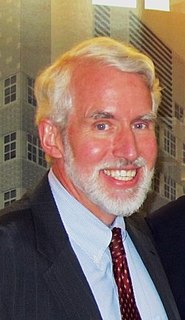Related Research Articles

Psychology is the scientific study of mind and behavior. Psychology includes the study of conscious and unconscious phenomena, including feelings and thoughts. It is an academic discipline of immense scope, crossing the boundaries between the natural and social sciences. Psychologists seek an understanding of the emergent properties of brains, linking the discipline to neuroscience. As social scientists, psychologists aim to understand the behavior of individuals and groups. Ψ is a Greek letter which is commonly associated with the science of psychology.
Michael Lawrence Hendricks is an American psychologist, suicidologist, and an advocate for the LGBT community. He has worked in private practice as a partner at the Washington Psychological Center, P.C. in northwest Washington, D.C., since 1999. Hendricks is an adjunct professor of clinical psychopharmacology and has taught at Argosy University, Howard University, and Catholic University of America. He is a Fellow of the American Psychological Association (APA).

Health psychology is the study of psychological and behavioral processes in health, illness, and healthcare. It is concerned with understanding how psychological, behavioral, and cultural factors contribute to physical health and illness. Psychological factors can affect health directly. For example, chronically occurring environmental stressors affecting the hypothalamic–pituitary–adrenal axis, cumulatively, can harm health. Behavioral factors can also affect a person's health. For example, certain behaviors can, over time, harm or enhance health. Health psychologists take a biopsychosocial approach. In other words, health psychologists understand health to be the product not only of biological processes but also of psychological, behavioral, and social processes.

Claude Mason Steele is a social psychologist and emeritus professor at Stanford University, where he is the I. James Quillen Endowed Dean, Emeritus at the Stanford Graduate School of Education, and Lucie Stern Professor in the Social Sciences, Emeritus.
Behavioral medicine is concerned with the integration of knowledge in the biological, behavioral, psychological, and social sciences relevant to health and illness. These sciences include epidemiology, anthropology, sociology, psychology, physiology, pharmacology, nutrition, neuroanatomy, endocrinology, and immunology. The term is often used interchangeably, but incorrectly, with health psychology. The practice of behavioral medicine encompasses health psychology, but also includes applied psychophysiological therapies such as biofeedback, hypnosis, and bio-behavioral therapy of physical disorders, aspects of occupational therapy, rehabilitation medicine, and physiatry, as well as preventive medicine. In contrast, health psychology represents a stronger emphasis specifically on psychology's role in both behavioral medicine and behavioral health.

Neal Elgar Miller was an American experimental psychologist. Described as an energetic man with a variety of interests, including physics, biology and writing, Miller entered the field of psychology to pursue these. With a background training in the sciences, he was inspired by professors and leading psychologists at the time to work on various areas in behavioral psychology and physiological psychology, specifically, relating visceral responses to behavior.

Jennifer A. Richeson is an American social psychologist who studies racial identity and interracial interactions. She is currently the Philip R. Allen Professor of Psychology at Yale University where she heads the Social Perception and Communication Lab. Prior to her appointment to the Yale faculty, Richeson was Professor of Psychology and African-American studies at Northwestern University. In 2015, she was elected to the United States National Academy of Sciences. Richeson was elected to the American Philosophical Society in 2022. Since 2021, she has been a member of the President’s Council of Advisors on Science and Technology (PCAST).
Steven C. Hayes is an American clinical psychologist and Nevada Foundation Professor at the University of Nevada, Reno Department of Psychology, where he is a faculty member in their Ph.D. program in behavior analysis. He is known for developing relational frame theory, an account of human higher cognition. He is the co-developer of acceptance and commitment therapy (ACT), a popular evidence-based form of psychotherapy that uses mindfulness, acceptance, and values-based methods, and is the co-developer of process-based therapy (PBT), a new approach to evidence-based therapies more generally. He also coined the term clinical behavior analysis.

Tamara Goldman Sher, Ph.D. is a licensed clinical psychologist and professor at The Family Institute at Northwestern University. She is a leading researcher in the fields of Behavioral Medicine and Couples Therapy. Sher was awarded a $2.4 million grant from the National Heart, Lung and Blood Institute of the National Institutes of Health (NIH) which combined both of these fields in a study measuring the benefits of couples' involvement in cardiac treatment. This grant is part of Sher's work with the National Institute of Health's Behavior Change Consortium. Sher's research has been mentioned in the Chicago Tribune, Psychology Today, on Chicago Public Radio, and published in several leading psychology journals.

Occupational health psychology (OHP) is an interdisciplinary area of psychology that is concerned with the health and safety of workers. OHP addresses a number of major topic areas including the impact of occupational stressors on physical and mental health, the impact of involuntary unemployment on physical and mental health, work-family balance, workplace violence and other forms of mistreatment, psychosocial workplace factors that affect accident risk and safety, and interventions designed to improve and/or protect worker health. Although OHP emerged from two distinct disciplines within applied psychology, namely, health psychology and industrial and organizational psychology, for a long time the psychology establishment, including leaders of industrial/organizational psychology, rarely dealt with occupational stress and employee health, creating a need for the emergence of OHP. OHP has also been informed by other disciplines, including occupational medicine, sociology, industrial engineering, and economics, as well as preventive medicine and public health. OHP is thus concerned with the relationship of psychosocial workplace factors to the development, maintenance, and promotion of workers' health and that of their families. The World Health Organization and the International Labour Organization estimate that exposure to long working hours causes an estimated 745,000 workers to die from ischemic heart disease and stroke in 2016, mediated by occupational stress.
Emotions in the workplace play a large role in how an entire organization communicates within itself and to the outside world. "Events at work have real emotional impact on participants. The consequences of emotional states in the workplace, both behaviors and attitudes, have substantial significance for individuals, groups, and society". "Positive emotions in the workplace help employees obtain favorable outcomes including achievement, job enrichment and higher quality social context". "Negative emotions, such as fear, anger, stress, hostility, sadness, and guilt, however increase the predictability of workplace deviance,", and how the outside world views the organization.

Sport psychology was defined by the European Federation of Sport in 1996, as the study of the psychological basis, processes, and effects of sport. Otherwise, sport is considered as any physical activity where the individuals engage for competition and health. Sport psychology is recognized as an interdisciplinary science that draws on knowledge from many related fields including biomechanics, physiology, kinesiology and psychology. It involves the study of how psychological factors affect performance and how participation in sport and exercise affect psychological and physical factors. Sport psychologists teach cognitive and behavioral strategies to athletes in order to improve their experience and performance in sports. In addition to instruction and training of psychological skills for performance improvement, applied sport psychology may include work with athletes, coaches, and parents regarding injury, rehabilitation, communication, team building, and career transitions.
Sheldon Cohen is the Robert E. Doherty University Professor of Psychology at Carnegie Mellon University. He is the director of the Laboratory for the Study of Stress, Immunity and Disease. He is a member of the Department of Psychology at Carnegie Mellon and Adjunct Professor of Psychiatry and of Pathology at the University of Pittsburgh School of Medicine.

Ovide F. Pomerleau is an American psychologist who pioneered the development of behavioral medicine. He is best known for his work on self-management problems and addiction, focusing on the behavioral, biological, and genetic bases of tobacco smoking and nicotine dependence.
Andrew Patrick Arthur Steptoe is a British psychologist and epidemiologist and Head of the Department of Behavioural Science and Health at University College London. He is a pioneer in health psychology and behavioural medicine in the UK and internationally, known for his work on psychosocial factors in cardiovascular disease, ageing, and positive wellbeing and health.
Elizabeth (Betsy) Levy Paluck is a professor in the department of psychology and the Princeton School of Public and International Affairs at Princeton University, where she also serves as deputy director of the Center for Behavioral Science & Policy. She is known for her work on prejudice, social norms and conflict reduction. She is best known for creating large-scale field experiments utilizing theoretical social psychology strategies and tools to formulate effective and practical methods for reducing conflict and discrimination. Due to her extensive work investigating the influences of the Rwandan genocide and her work with high school bullying, Paluck is considered a leading authority on field-tested methods of changing intolerant and aggressive social behavior.

Janice K Kiecolt-Glaser is S. Robert Davis Chair of Medicine and Distinguished University Professor at the Ohio State University College of Medicine. She is a clinical health psychologist specializing in psychoneuroimmunology and Director of the Ohio State Institute for Behavioral Medicine Research. Her research on stress associated with caregiving and marital relationships has been featured in The New York Times, The Wall Street Journal, and many other news outlets.

Thomas A. Wadden is a clinical psychologist and educator who is known for his research on the treatment of obesity by methods that include lifestyle modification, pharmacotherapy, and bariatric surgery. He is the Albert J. Stunkard Professor of Psychology in Psychiatry at the Perelman School of Medicine at the University of Pennsylvania and former director of the University's Center for Weight and Eating Disorders. He also is Visiting Professor of Psychology at Haverford College.
Margie E. Lachman is an American psychologist. She is the Minnie and Harold Fierman Professor of Psychology at Brandeis University, director of the Lifespan Developmental Psychology Lab and the director of the Boston Roybal Center for Active Lifestyle Interventions. She was editor of the Journal of Gerontology: Psychological Sciences (2000-2003), and has edited two volumes on midlife development. She is a fellow of the American Psychological Association, Division 20 and the Gerontological Society of America. Lachman's research is in the area of lifespan development with a focus on midlife and later life. Her current work is aimed at identifying psychosocial and behavioral factors that can protect against, minimize, or compensate for declines in cognition and health. She is conducting studies to examine long-term predictors of psychological and physical health, laboratory-based experiments to identify psychological and physiological processes involved in aging-related changes, especially in memory, and intervention studies to enhance performance and promote adaptive functioning through active engagement and physical activity.
Marcia Guttentag was clinical social psychologist whose work focused on psychological issues related to children, poverty, women's rights, and mental health. As one of the founders of the Evaluation Research Society, Guttentag is known for being a pioneer in promoting evaluation research as a distinct field of social science. She was an elected Fellow of the American Association for the Advancement of Science.
References
- ↑ "Web Login Service".
- ↑ "NS Faculty | GDBBS | Emory University".
- ↑ "Jay Michael Weiss - MacArthur Foundation". www.macfound.org. Retrieved 2018-08-13.
- ↑ "Society of Behavioral Medicine - SBM". Archived from the original on 2009-01-04. Retrieved 2010-04-06.